Analysis of Motivation, Talent Management & Performance Appraisal HRM
VerifiedAdded on 2023/05/29
|10
|2513
|196
Essay
AI Summary
This essay provides a comprehensive overview of key concepts in Human Resource Management. It begins by comparing and contrasting content and process theories of motivation, specifically Maslow's Hierarchy of Needs and Vroom's Expectancy Theory, highlighting their implications and limitations for managers. The essay then delves into talent management, emphasizing the importance of attracting, retaining, and developing employees in today's fast-paced business environment, and proposes strategies for effective talent management. Furthermore, it examines the challenges associated with performance appraisal systems and suggests key elements for improving performance management. Finally, the essay discusses different leadership approaches, including autocratic, participative, and laissez-faire styles, and advocates for the use of leadership to drive organizational success in the global economic environment. The document is available on Desklib, a platform offering a wide range of study resources for students.
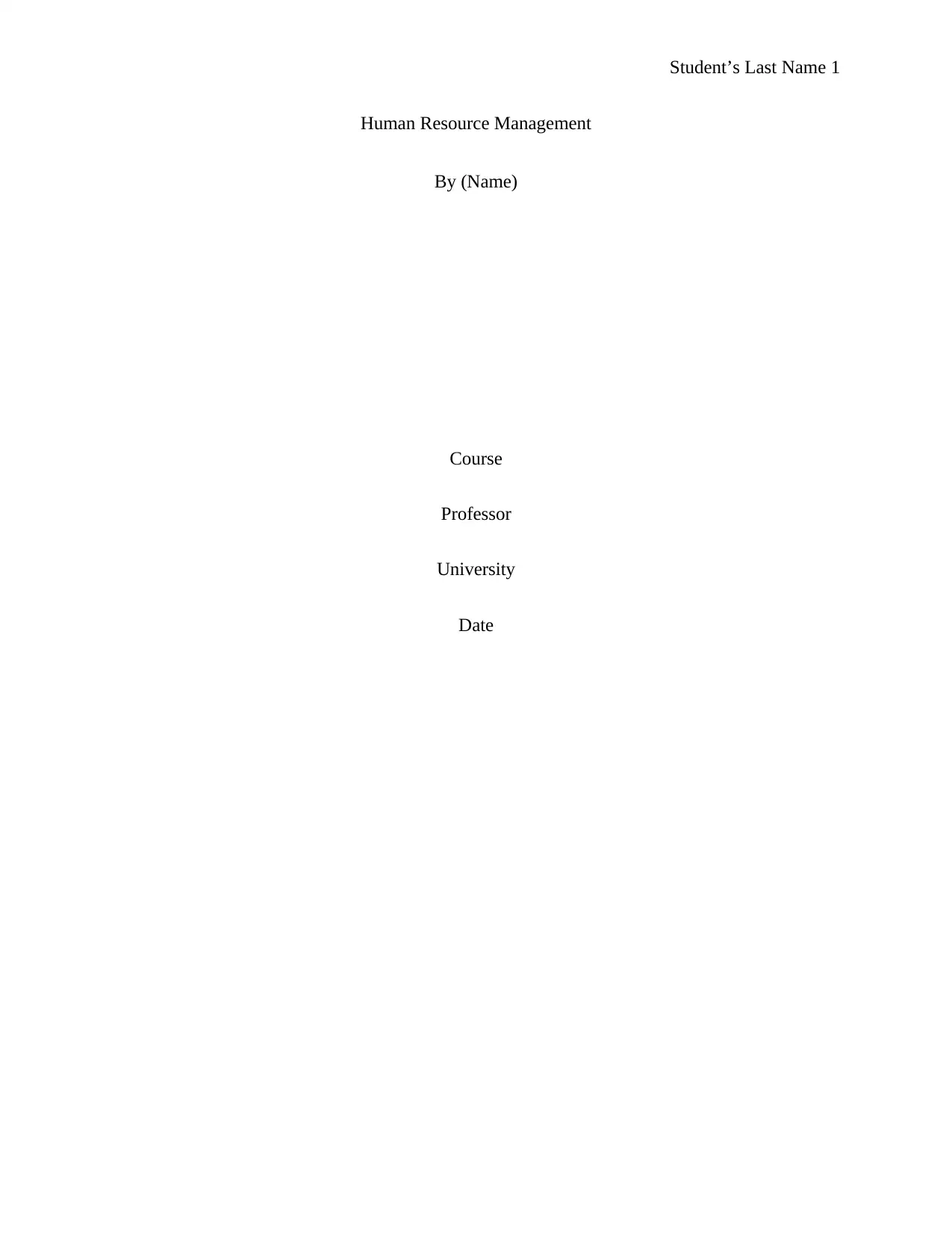
Student’s Last Name 1
Human Resource Management
By (Name)
Course
Professor
University
Date
Human Resource Management
By (Name)
Course
Professor
University
Date
Paraphrase This Document
Need a fresh take? Get an instant paraphrase of this document with our AI Paraphraser

Student’s Last Name 2
Question 1.
Motivation theories are classified into content and process theories. Content theories
focus on individual goals and needs as factors that motivate people. Example of the content
theory is Maslow’s Hierarchy of needs theory (Managementstudyguide.com, 2018). On the other
hand, process theories deal with how motivation occurs. One example of this theory is Vroom’s
Expectancy theory. Maslow Hierarchy of Needs is based on five needs within every individual.
The needs are presented in a pyramid tier with the based need having to be satisfied first before
an individual goes to the higher level in the tier.
(Managementstudyguide.com, 2018)
Physiological needs are the basic human wants such as food, air water, and other basic
amenities. Safety needs include the need for security and protection. It involves both physical,
emotional and environmental protection (Lester, 2013, pp.16). Further, social needs encompass
the need for friendship, care, love, and affection. Esteem need include confidence, self-respect,
attention, status, and recognition. Lastly, self-actualization is the urge to achieve one's potential.it
involves the desire to acquire additional knowledge, experience growth, and self-satisfaction.
According to this theory, unsatisfied needs motivates individuals. As one satisfies the need of the
lower level, he is motivated to address the next level need.
Question 1.
Motivation theories are classified into content and process theories. Content theories
focus on individual goals and needs as factors that motivate people. Example of the content
theory is Maslow’s Hierarchy of needs theory (Managementstudyguide.com, 2018). On the other
hand, process theories deal with how motivation occurs. One example of this theory is Vroom’s
Expectancy theory. Maslow Hierarchy of Needs is based on five needs within every individual.
The needs are presented in a pyramid tier with the based need having to be satisfied first before
an individual goes to the higher level in the tier.
(Managementstudyguide.com, 2018)
Physiological needs are the basic human wants such as food, air water, and other basic
amenities. Safety needs include the need for security and protection. It involves both physical,
emotional and environmental protection (Lester, 2013, pp.16). Further, social needs encompass
the need for friendship, care, love, and affection. Esteem need include confidence, self-respect,
attention, status, and recognition. Lastly, self-actualization is the urge to achieve one's potential.it
involves the desire to acquire additional knowledge, experience growth, and self-satisfaction.
According to this theory, unsatisfied needs motivates individuals. As one satisfies the need of the
lower level, he is motivated to address the next level need.
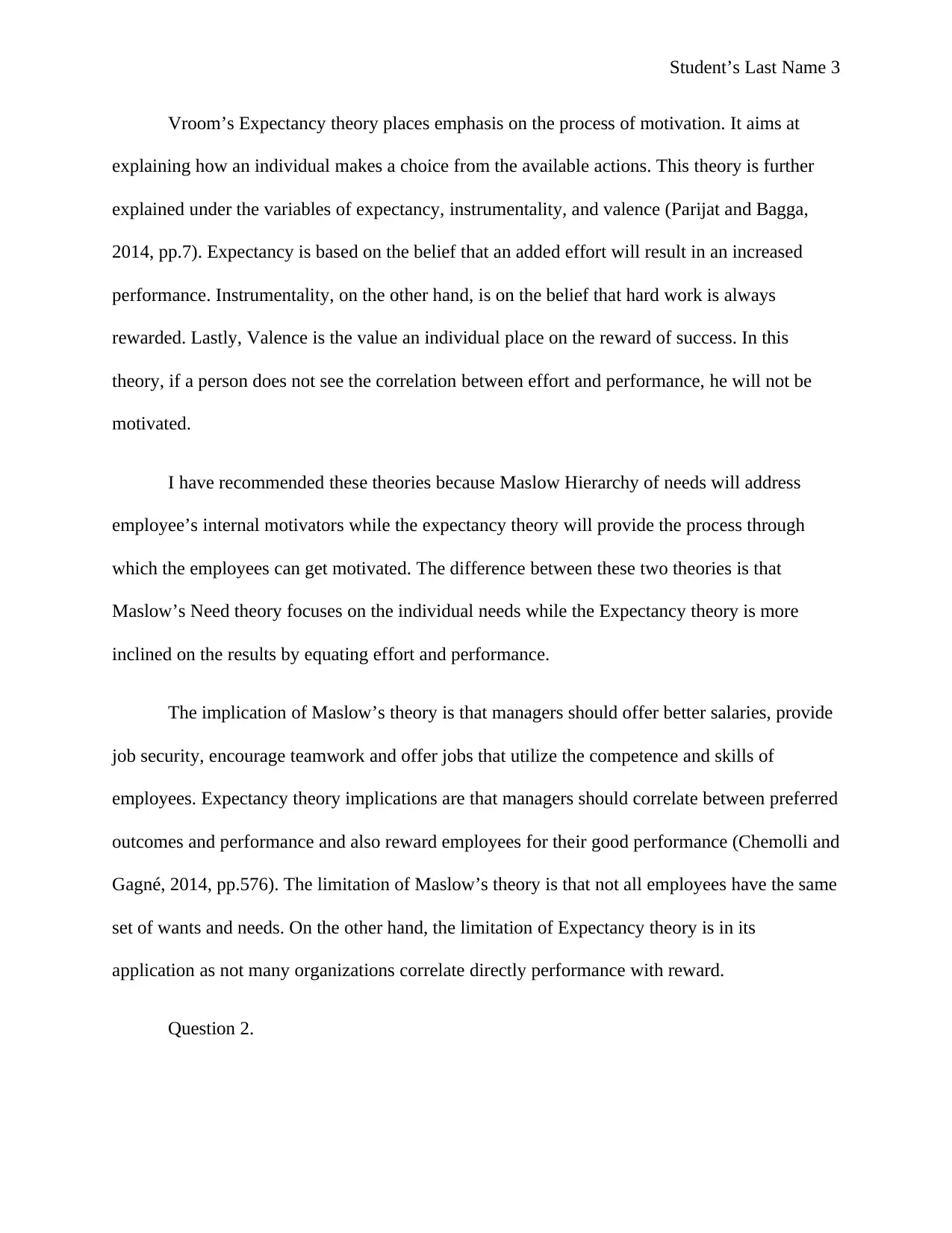
Student’s Last Name 3
Vroom’s Expectancy theory places emphasis on the process of motivation. It aims at
explaining how an individual makes a choice from the available actions. This theory is further
explained under the variables of expectancy, instrumentality, and valence (Parijat and Bagga,
2014, pp.7). Expectancy is based on the belief that an added effort will result in an increased
performance. Instrumentality, on the other hand, is on the belief that hard work is always
rewarded. Lastly, Valence is the value an individual place on the reward of success. In this
theory, if a person does not see the correlation between effort and performance, he will not be
motivated.
I have recommended these theories because Maslow Hierarchy of needs will address
employee’s internal motivators while the expectancy theory will provide the process through
which the employees can get motivated. The difference between these two theories is that
Maslow’s Need theory focuses on the individual needs while the Expectancy theory is more
inclined on the results by equating effort and performance.
The implication of Maslow’s theory is that managers should offer better salaries, provide
job security, encourage teamwork and offer jobs that utilize the competence and skills of
employees. Expectancy theory implications are that managers should correlate between preferred
outcomes and performance and also reward employees for their good performance (Chemolli and
Gagné, 2014, pp.576). The limitation of Maslow’s theory is that not all employees have the same
set of wants and needs. On the other hand, the limitation of Expectancy theory is in its
application as not many organizations correlate directly performance with reward.
Question 2.
Vroom’s Expectancy theory places emphasis on the process of motivation. It aims at
explaining how an individual makes a choice from the available actions. This theory is further
explained under the variables of expectancy, instrumentality, and valence (Parijat and Bagga,
2014, pp.7). Expectancy is based on the belief that an added effort will result in an increased
performance. Instrumentality, on the other hand, is on the belief that hard work is always
rewarded. Lastly, Valence is the value an individual place on the reward of success. In this
theory, if a person does not see the correlation between effort and performance, he will not be
motivated.
I have recommended these theories because Maslow Hierarchy of needs will address
employee’s internal motivators while the expectancy theory will provide the process through
which the employees can get motivated. The difference between these two theories is that
Maslow’s Need theory focuses on the individual needs while the Expectancy theory is more
inclined on the results by equating effort and performance.
The implication of Maslow’s theory is that managers should offer better salaries, provide
job security, encourage teamwork and offer jobs that utilize the competence and skills of
employees. Expectancy theory implications are that managers should correlate between preferred
outcomes and performance and also reward employees for their good performance (Chemolli and
Gagné, 2014, pp.576). The limitation of Maslow’s theory is that not all employees have the same
set of wants and needs. On the other hand, the limitation of Expectancy theory is in its
application as not many organizations correlate directly performance with reward.
Question 2.
⊘ This is a preview!⊘
Do you want full access?
Subscribe today to unlock all pages.

Trusted by 1+ million students worldwide
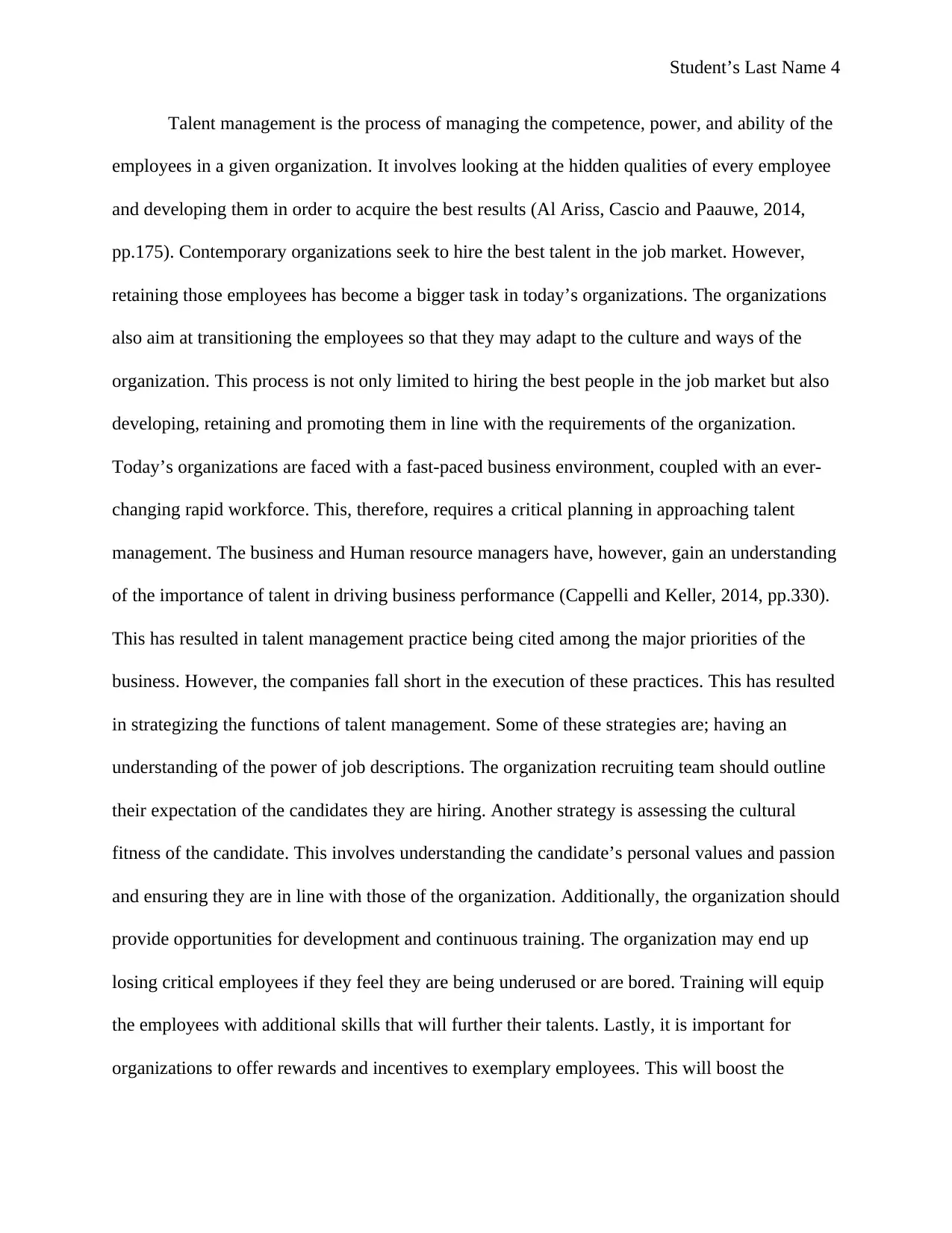
Student’s Last Name 4
Talent management is the process of managing the competence, power, and ability of the
employees in a given organization. It involves looking at the hidden qualities of every employee
and developing them in order to acquire the best results (Al Ariss, Cascio and Paauwe, 2014,
pp.175). Contemporary organizations seek to hire the best talent in the job market. However,
retaining those employees has become a bigger task in today’s organizations. The organizations
also aim at transitioning the employees so that they may adapt to the culture and ways of the
organization. This process is not only limited to hiring the best people in the job market but also
developing, retaining and promoting them in line with the requirements of the organization.
Today’s organizations are faced with a fast-paced business environment, coupled with an ever-
changing rapid workforce. This, therefore, requires a critical planning in approaching talent
management. The business and Human resource managers have, however, gain an understanding
of the importance of talent in driving business performance (Cappelli and Keller, 2014, pp.330).
This has resulted in talent management practice being cited among the major priorities of the
business. However, the companies fall short in the execution of these practices. This has resulted
in strategizing the functions of talent management. Some of these strategies are; having an
understanding of the power of job descriptions. The organization recruiting team should outline
their expectation of the candidates they are hiring. Another strategy is assessing the cultural
fitness of the candidate. This involves understanding the candidate’s personal values and passion
and ensuring they are in line with those of the organization. Additionally, the organization should
provide opportunities for development and continuous training. The organization may end up
losing critical employees if they feel they are being underused or are bored. Training will equip
the employees with additional skills that will further their talents. Lastly, it is important for
organizations to offer rewards and incentives to exemplary employees. This will boost the
Talent management is the process of managing the competence, power, and ability of the
employees in a given organization. It involves looking at the hidden qualities of every employee
and developing them in order to acquire the best results (Al Ariss, Cascio and Paauwe, 2014,
pp.175). Contemporary organizations seek to hire the best talent in the job market. However,
retaining those employees has become a bigger task in today’s organizations. The organizations
also aim at transitioning the employees so that they may adapt to the culture and ways of the
organization. This process is not only limited to hiring the best people in the job market but also
developing, retaining and promoting them in line with the requirements of the organization.
Today’s organizations are faced with a fast-paced business environment, coupled with an ever-
changing rapid workforce. This, therefore, requires a critical planning in approaching talent
management. The business and Human resource managers have, however, gain an understanding
of the importance of talent in driving business performance (Cappelli and Keller, 2014, pp.330).
This has resulted in talent management practice being cited among the major priorities of the
business. However, the companies fall short in the execution of these practices. This has resulted
in strategizing the functions of talent management. Some of these strategies are; having an
understanding of the power of job descriptions. The organization recruiting team should outline
their expectation of the candidates they are hiring. Another strategy is assessing the cultural
fitness of the candidate. This involves understanding the candidate’s personal values and passion
and ensuring they are in line with those of the organization. Additionally, the organization should
provide opportunities for development and continuous training. The organization may end up
losing critical employees if they feel they are being underused or are bored. Training will equip
the employees with additional skills that will further their talents. Lastly, it is important for
organizations to offer rewards and incentives to exemplary employees. This will boost the
Paraphrase This Document
Need a fresh take? Get an instant paraphrase of this document with our AI Paraphraser
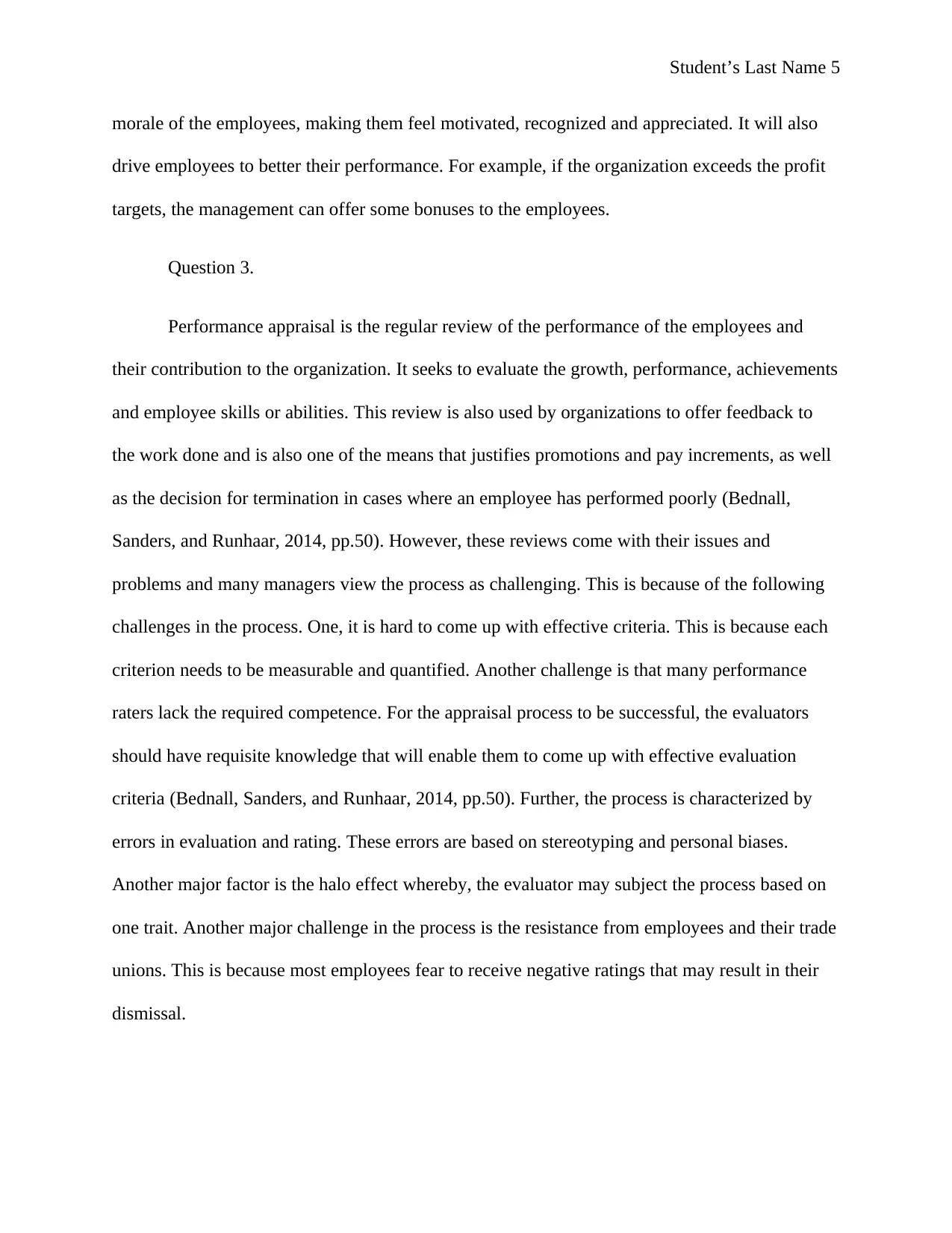
Student’s Last Name 5
morale of the employees, making them feel motivated, recognized and appreciated. It will also
drive employees to better their performance. For example, if the organization exceeds the profit
targets, the management can offer some bonuses to the employees.
Question 3.
Performance appraisal is the regular review of the performance of the employees and
their contribution to the organization. It seeks to evaluate the growth, performance, achievements
and employee skills or abilities. This review is also used by organizations to offer feedback to
the work done and is also one of the means that justifies promotions and pay increments, as well
as the decision for termination in cases where an employee has performed poorly (Bednall,
Sanders, and Runhaar, 2014, pp.50). However, these reviews come with their issues and
problems and many managers view the process as challenging. This is because of the following
challenges in the process. One, it is hard to come up with effective criteria. This is because each
criterion needs to be measurable and quantified. Another challenge is that many performance
raters lack the required competence. For the appraisal process to be successful, the evaluators
should have requisite knowledge that will enable them to come up with effective evaluation
criteria (Bednall, Sanders, and Runhaar, 2014, pp.50). Further, the process is characterized by
errors in evaluation and rating. These errors are based on stereotyping and personal biases.
Another major factor is the halo effect whereby, the evaluator may subject the process based on
one trait. Another major challenge in the process is the resistance from employees and their trade
unions. This is because most employees fear to receive negative ratings that may result in their
dismissal.
morale of the employees, making them feel motivated, recognized and appreciated. It will also
drive employees to better their performance. For example, if the organization exceeds the profit
targets, the management can offer some bonuses to the employees.
Question 3.
Performance appraisal is the regular review of the performance of the employees and
their contribution to the organization. It seeks to evaluate the growth, performance, achievements
and employee skills or abilities. This review is also used by organizations to offer feedback to
the work done and is also one of the means that justifies promotions and pay increments, as well
as the decision for termination in cases where an employee has performed poorly (Bednall,
Sanders, and Runhaar, 2014, pp.50). However, these reviews come with their issues and
problems and many managers view the process as challenging. This is because of the following
challenges in the process. One, it is hard to come up with effective criteria. This is because each
criterion needs to be measurable and quantified. Another challenge is that many performance
raters lack the required competence. For the appraisal process to be successful, the evaluators
should have requisite knowledge that will enable them to come up with effective evaluation
criteria (Bednall, Sanders, and Runhaar, 2014, pp.50). Further, the process is characterized by
errors in evaluation and rating. These errors are based on stereotyping and personal biases.
Another major factor is the halo effect whereby, the evaluator may subject the process based on
one trait. Another major challenge in the process is the resistance from employees and their trade
unions. This is because most employees fear to receive negative ratings that may result in their
dismissal.
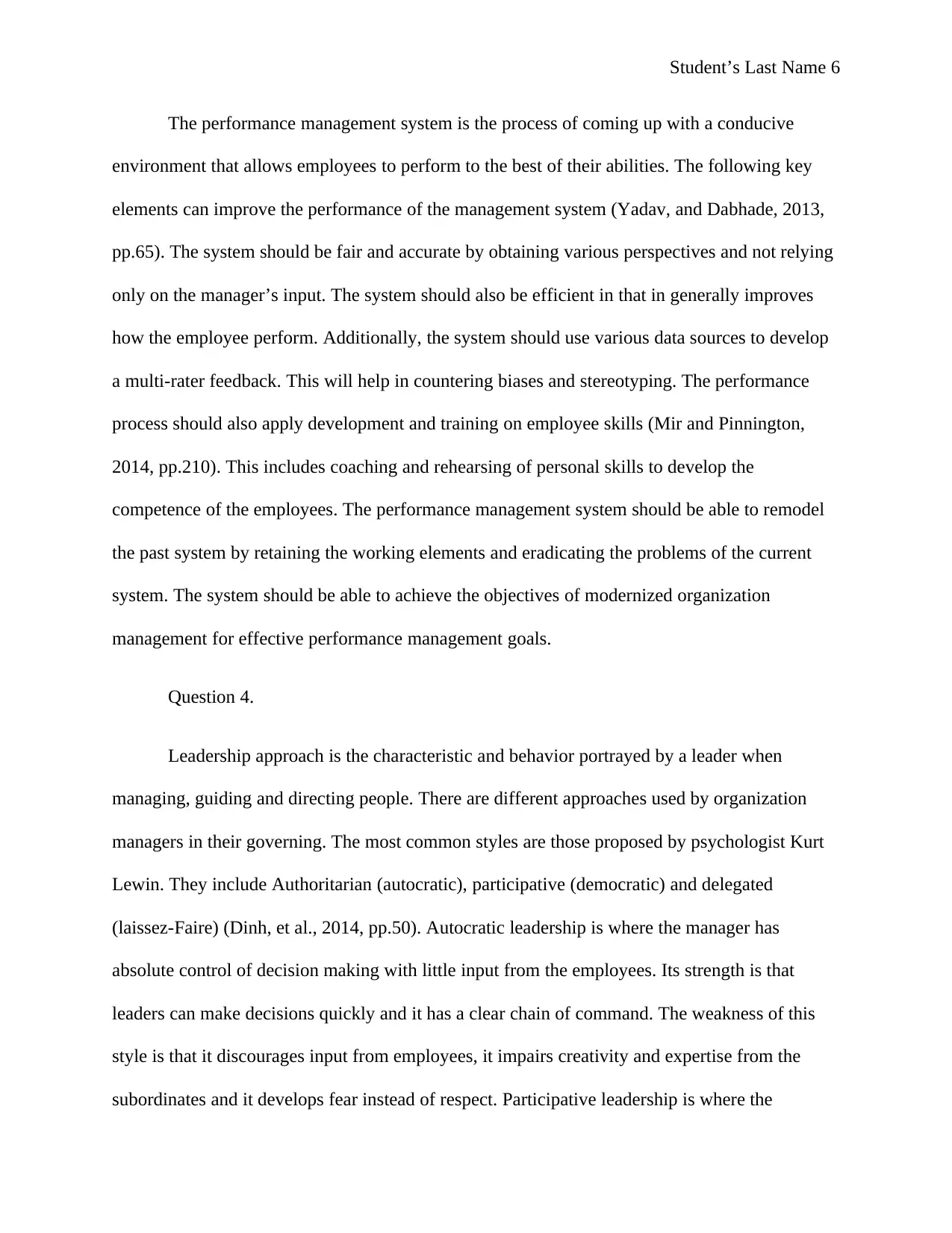
Student’s Last Name 6
The performance management system is the process of coming up with a conducive
environment that allows employees to perform to the best of their abilities. The following key
elements can improve the performance of the management system (Yadav, and Dabhade, 2013,
pp.65). The system should be fair and accurate by obtaining various perspectives and not relying
only on the manager’s input. The system should also be efficient in that in generally improves
how the employee perform. Additionally, the system should use various data sources to develop
a multi-rater feedback. This will help in countering biases and stereotyping. The performance
process should also apply development and training on employee skills (Mir and Pinnington,
2014, pp.210). This includes coaching and rehearsing of personal skills to develop the
competence of the employees. The performance management system should be able to remodel
the past system by retaining the working elements and eradicating the problems of the current
system. The system should be able to achieve the objectives of modernized organization
management for effective performance management goals.
Question 4.
Leadership approach is the characteristic and behavior portrayed by a leader when
managing, guiding and directing people. There are different approaches used by organization
managers in their governing. The most common styles are those proposed by psychologist Kurt
Lewin. They include Authoritarian (autocratic), participative (democratic) and delegated
(laissez-Faire) (Dinh, et al., 2014, pp.50). Autocratic leadership is where the manager has
absolute control of decision making with little input from the employees. Its strength is that
leaders can make decisions quickly and it has a clear chain of command. The weakness of this
style is that it discourages input from employees, it impairs creativity and expertise from the
subordinates and it develops fear instead of respect. Participative leadership is where the
The performance management system is the process of coming up with a conducive
environment that allows employees to perform to the best of their abilities. The following key
elements can improve the performance of the management system (Yadav, and Dabhade, 2013,
pp.65). The system should be fair and accurate by obtaining various perspectives and not relying
only on the manager’s input. The system should also be efficient in that in generally improves
how the employee perform. Additionally, the system should use various data sources to develop
a multi-rater feedback. This will help in countering biases and stereotyping. The performance
process should also apply development and training on employee skills (Mir and Pinnington,
2014, pp.210). This includes coaching and rehearsing of personal skills to develop the
competence of the employees. The performance management system should be able to remodel
the past system by retaining the working elements and eradicating the problems of the current
system. The system should be able to achieve the objectives of modernized organization
management for effective performance management goals.
Question 4.
Leadership approach is the characteristic and behavior portrayed by a leader when
managing, guiding and directing people. There are different approaches used by organization
managers in their governing. The most common styles are those proposed by psychologist Kurt
Lewin. They include Authoritarian (autocratic), participative (democratic) and delegated
(laissez-Faire) (Dinh, et al., 2014, pp.50). Autocratic leadership is where the manager has
absolute control of decision making with little input from the employees. Its strength is that
leaders can make decisions quickly and it has a clear chain of command. The weakness of this
style is that it discourages input from employees, it impairs creativity and expertise from the
subordinates and it develops fear instead of respect. Participative leadership is where the
⊘ This is a preview!⊘
Do you want full access?
Subscribe today to unlock all pages.

Trusted by 1+ million students worldwide

Student’s Last Name 7
managers involve the employees in the decision making process but retains the ultimate authority
to make decisions. The strength of this approach is that it is applicable in almost every
organization, it is the best approach for solving complex problems due to the input of many
people and it encourages creativity among employees (Parris and Peachey, 2013, pp.380). The
weakness of this style is that it consumes a lot of time due to its consensus approach. It may also
lead to conflicts due to different opinion tabled by the decision makers. Lastly, the decision made
may not be effective in a situation whereby there has been an input of less-skilled workers.
Laissez-Faire leadership approach allows other to make the decision for the manager giving the
workers independence to perform as they deem fit. The strength of this approach is that it
facilitates personal development. It also boosts innovation and creativity by encouraging multiple
perspectives. Additionally, it creates an inviting working environment by giving workers
autonomy. The weakness of this style is that some workers may take advantage of the situation
and slacken in the job. Additionally, this style creates a vacuum of responsibility when a wrong
is committed.
Leadership is important in facilitating the success of an organization in the global
business environment, as a good leader can create new opportunities and mobilize current
resources to the advantage of the organization. Involving the employees in the decision-making
process may improve their experience and foster creativity and innovation. There is a huge
correlation between leadership approaches and exploitation of resources. This approaches should
be flexible and dynamic to enable the managers to utilize opportunities for maximum resource
leverage. Leadership styles have adapted to become among the indexes for consideration when
gauging business competitiveness.
managers involve the employees in the decision making process but retains the ultimate authority
to make decisions. The strength of this approach is that it is applicable in almost every
organization, it is the best approach for solving complex problems due to the input of many
people and it encourages creativity among employees (Parris and Peachey, 2013, pp.380). The
weakness of this style is that it consumes a lot of time due to its consensus approach. It may also
lead to conflicts due to different opinion tabled by the decision makers. Lastly, the decision made
may not be effective in a situation whereby there has been an input of less-skilled workers.
Laissez-Faire leadership approach allows other to make the decision for the manager giving the
workers independence to perform as they deem fit. The strength of this approach is that it
facilitates personal development. It also boosts innovation and creativity by encouraging multiple
perspectives. Additionally, it creates an inviting working environment by giving workers
autonomy. The weakness of this style is that some workers may take advantage of the situation
and slacken in the job. Additionally, this style creates a vacuum of responsibility when a wrong
is committed.
Leadership is important in facilitating the success of an organization in the global
business environment, as a good leader can create new opportunities and mobilize current
resources to the advantage of the organization. Involving the employees in the decision-making
process may improve their experience and foster creativity and innovation. There is a huge
correlation between leadership approaches and exploitation of resources. This approaches should
be flexible and dynamic to enable the managers to utilize opportunities for maximum resource
leverage. Leadership styles have adapted to become among the indexes for consideration when
gauging business competitiveness.
Paraphrase This Document
Need a fresh take? Get an instant paraphrase of this document with our AI Paraphraser
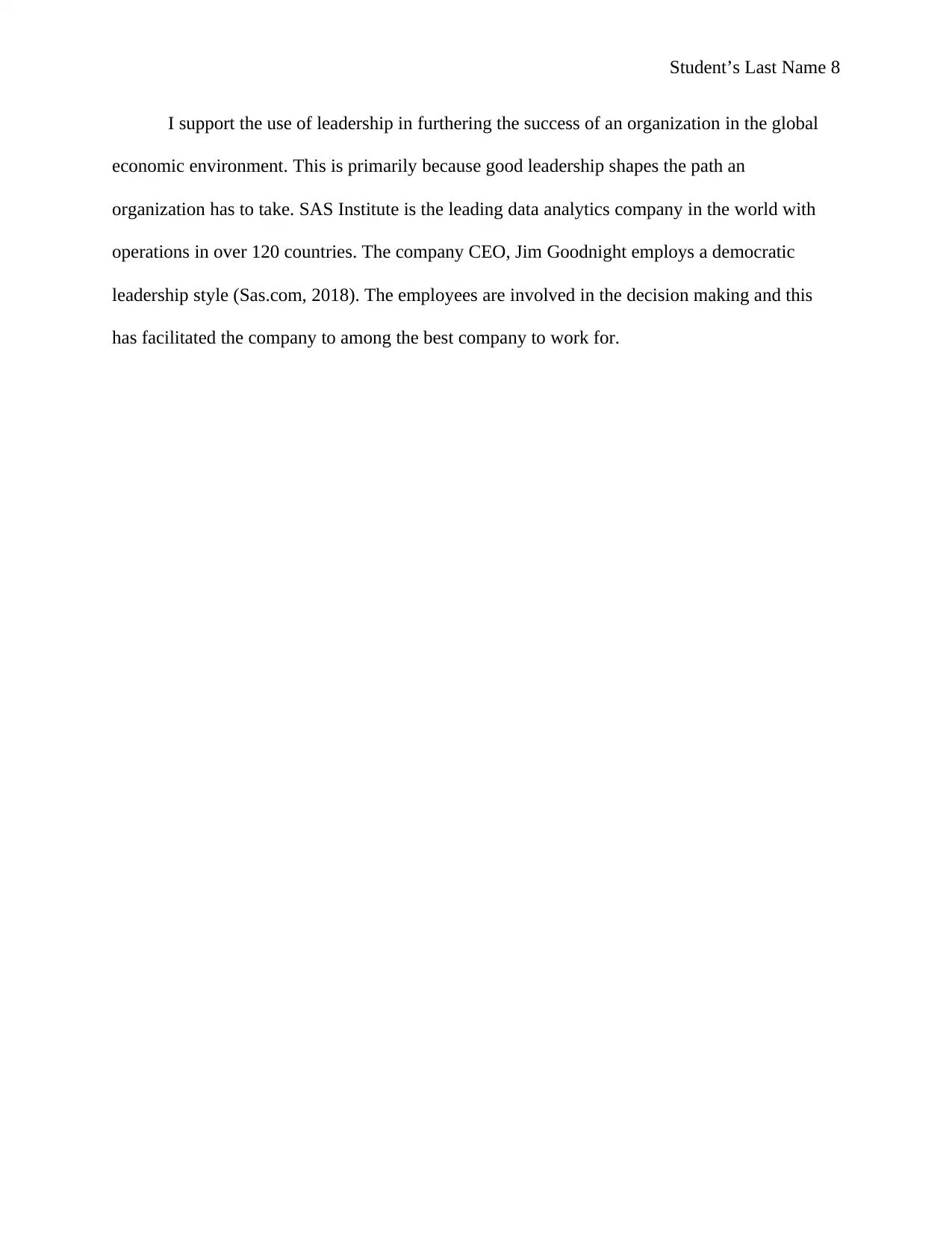
Student’s Last Name 8
I support the use of leadership in furthering the success of an organization in the global
economic environment. This is primarily because good leadership shapes the path an
organization has to take. SAS Institute is the leading data analytics company in the world with
operations in over 120 countries. The company CEO, Jim Goodnight employs a democratic
leadership style (Sas.com, 2018). The employees are involved in the decision making and this
has facilitated the company to among the best company to work for.
I support the use of leadership in furthering the success of an organization in the global
economic environment. This is primarily because good leadership shapes the path an
organization has to take. SAS Institute is the leading data analytics company in the world with
operations in over 120 countries. The company CEO, Jim Goodnight employs a democratic
leadership style (Sas.com, 2018). The employees are involved in the decision making and this
has facilitated the company to among the best company to work for.

Student’s Last Name 9
Bibliography
Al Ariss, A., Cascio, W.F. and Paauwe, J., 2014. Talent management: Current theories and future
research directions. Journal of World Business, 49(2), pp.173-179.
Bednall, T.C., Sanders, K. and Runhaar, P., 2014. Stimulating informal learning activities
through perceptions of performance appraisal quality and human resource management system
strength: A two-wave study. Academy of Management Learning & Education, 13(1), pp.45-61.
Cappelli, P. and Keller, J.R., 2014. Talent management: Conceptual approaches and practical
challenges. Annu. Rev. Organ. Psychol. Organ. Behav., 1(1), pp.305-331.
Chemolli, E. and Gagné, M., 2014. Evidence against the continuum structure underlying
motivation measures derived from self-determination theory. Psychological Assessment, 26(2),
p.575-602.
Dinh, J.E., Lord, R.G., Gardner, W.L., Meuser, J.D., Liden, R.C. and Hu, J., 2014. Leadership
theory and research in the new millennium: Current theoretical trends and changing
perspectives. The Leadership Quarterly, 25(1), pp.36-62.
Lester, D., 2013. Measuring Maslow's hierarchy of needs. Psychological Reports, 113(1), pp.15-
17.
Managementstudyguide.com. (2018). Maslows Hierarchy of Needs Theory. [online] Available
at: https://www.managementstudyguide.com/maslows-hierarchy-needs-theory.htm [Accessed 3
Dec. 2018].
Bibliography
Al Ariss, A., Cascio, W.F. and Paauwe, J., 2014. Talent management: Current theories and future
research directions. Journal of World Business, 49(2), pp.173-179.
Bednall, T.C., Sanders, K. and Runhaar, P., 2014. Stimulating informal learning activities
through perceptions of performance appraisal quality and human resource management system
strength: A two-wave study. Academy of Management Learning & Education, 13(1), pp.45-61.
Cappelli, P. and Keller, J.R., 2014. Talent management: Conceptual approaches and practical
challenges. Annu. Rev. Organ. Psychol. Organ. Behav., 1(1), pp.305-331.
Chemolli, E. and Gagné, M., 2014. Evidence against the continuum structure underlying
motivation measures derived from self-determination theory. Psychological Assessment, 26(2),
p.575-602.
Dinh, J.E., Lord, R.G., Gardner, W.L., Meuser, J.D., Liden, R.C. and Hu, J., 2014. Leadership
theory and research in the new millennium: Current theoretical trends and changing
perspectives. The Leadership Quarterly, 25(1), pp.36-62.
Lester, D., 2013. Measuring Maslow's hierarchy of needs. Psychological Reports, 113(1), pp.15-
17.
Managementstudyguide.com. (2018). Maslows Hierarchy of Needs Theory. [online] Available
at: https://www.managementstudyguide.com/maslows-hierarchy-needs-theory.htm [Accessed 3
Dec. 2018].
⊘ This is a preview!⊘
Do you want full access?
Subscribe today to unlock all pages.

Trusted by 1+ million students worldwide
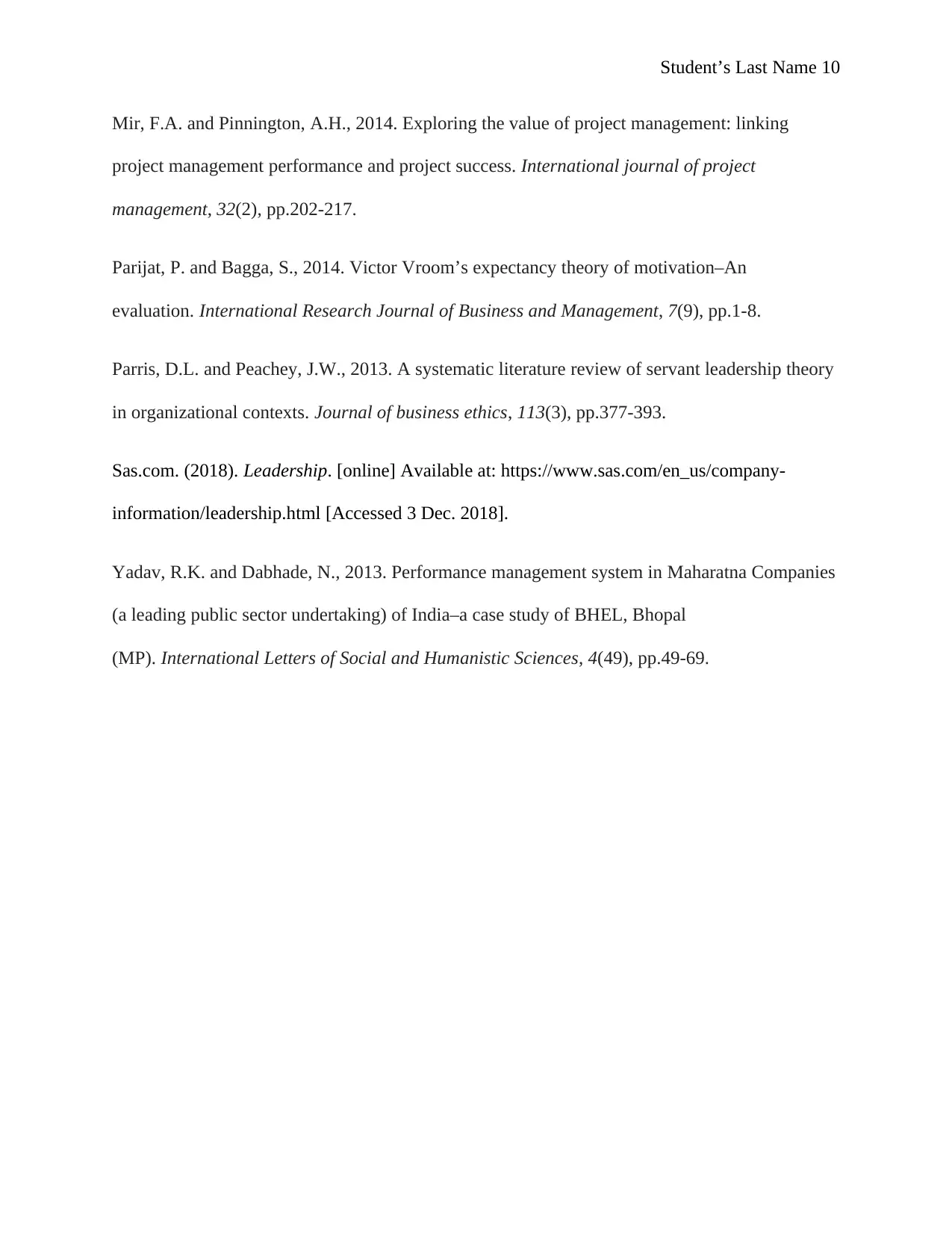
Student’s Last Name 10
Mir, F.A. and Pinnington, A.H., 2014. Exploring the value of project management: linking
project management performance and project success. International journal of project
management, 32(2), pp.202-217.
Parijat, P. and Bagga, S., 2014. Victor Vroom’s expectancy theory of motivation–An
evaluation. International Research Journal of Business and Management, 7(9), pp.1-8.
Parris, D.L. and Peachey, J.W., 2013. A systematic literature review of servant leadership theory
in organizational contexts. Journal of business ethics, 113(3), pp.377-393.
Sas.com. (2018). Leadership. [online] Available at: https://www.sas.com/en_us/company-
information/leadership.html [Accessed 3 Dec. 2018].
Yadav, R.K. and Dabhade, N., 2013. Performance management system in Maharatna Companies
(a leading public sector undertaking) of India–a case study of BHEL, Bhopal
(MP). International Letters of Social and Humanistic Sciences, 4(49), pp.49-69.
Mir, F.A. and Pinnington, A.H., 2014. Exploring the value of project management: linking
project management performance and project success. International journal of project
management, 32(2), pp.202-217.
Parijat, P. and Bagga, S., 2014. Victor Vroom’s expectancy theory of motivation–An
evaluation. International Research Journal of Business and Management, 7(9), pp.1-8.
Parris, D.L. and Peachey, J.W., 2013. A systematic literature review of servant leadership theory
in organizational contexts. Journal of business ethics, 113(3), pp.377-393.
Sas.com. (2018). Leadership. [online] Available at: https://www.sas.com/en_us/company-
information/leadership.html [Accessed 3 Dec. 2018].
Yadav, R.K. and Dabhade, N., 2013. Performance management system in Maharatna Companies
(a leading public sector undertaking) of India–a case study of BHEL, Bhopal
(MP). International Letters of Social and Humanistic Sciences, 4(49), pp.49-69.
1 out of 10
Related Documents
Your All-in-One AI-Powered Toolkit for Academic Success.
+13062052269
info@desklib.com
Available 24*7 on WhatsApp / Email
![[object Object]](/_next/static/media/star-bottom.7253800d.svg)
Unlock your academic potential
Copyright © 2020–2026 A2Z Services. All Rights Reserved. Developed and managed by ZUCOL.





